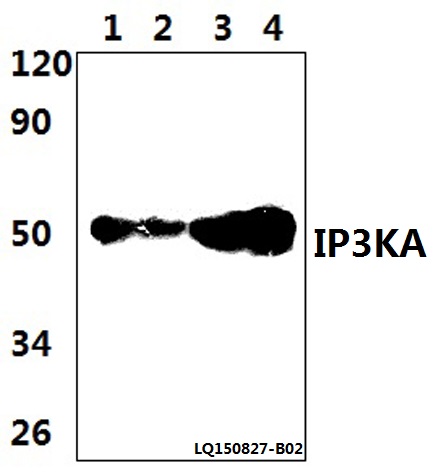Product Name :
IP3KA (H431) polyclonal antibody Background :
Inositol 1,4,5-trisphosphate (Ins(1,4,5)P3) regulates the level of calcium within the cell by releasing calcium from intracellular stores. Ins(1,4,5)P3 is phosphorylated by inositol 1,4,5-trisphosphate 3-kinase (IP3K) to form inositol 1,3,4,5-tetrakisphosphate (Ins(1,4,5)P4), which is is thought to regulate the influx of calcium across the plasma membrane. IP3K exists as three isoforms, IP3KA, B, and C. IP3KA, the most highly characterized isoform, is approximately 51 kDa and is expressed in rat brain and testis. IP3KB has a molecular weight of 74 kDa and is expressed in various rat tissues such as lung, thymus, testis, brain, and heart. IP3K activity is stimulated in the presence of calmodulin via phosphorylation by cAMP-dependent protein kinase, protein kinase C, or calcium/calmodulin dependent protein kinase II and, subsequently, mediates the inositol phosphate signaling pathways. Product :
Rabbit IgG, 1mg/ml in PBS with 0.02% sodium azide, 50% glycerol, pH7.2 Storage&Stability :
Store at 4°C short term. Aliquot and store at -20°C long term. Avoid freeze-thaw cycles. Specificity :
IP3KA (H431) polyclonal antibody detects endogenous levels of IP3KA protein. Immunogen :
Synthetic peptide, corresponding to amino acids 400-450 of Human IP3KA. Conjugate :
Unconjugated Modification :
Unmodification
IP3KA (H431) polyclonal antibody Background :
Inositol 1,4,5-trisphosphate (Ins(1,4,5)P3) regulates the level of calcium within the cell by releasing calcium from intracellular stores. Ins(1,4,5)P3 is phosphorylated by inositol 1,4,5-trisphosphate 3-kinase (IP3K) to form inositol 1,3,4,5-tetrakisphosphate (Ins(1,4,5)P4), which is is thought to regulate the influx of calcium across the plasma membrane. IP3K exists as three isoforms, IP3KA, B, and C. IP3KA, the most highly characterized isoform, is approximately 51 kDa and is expressed in rat brain and testis. IP3KB has a molecular weight of 74 kDa and is expressed in various rat tissues such as lung, thymus, testis, brain, and heart. IP3K activity is stimulated in the presence of calmodulin via phosphorylation by cAMP-dependent protein kinase, protein kinase C, or calcium/calmodulin dependent protein kinase II and, subsequently, mediates the inositol phosphate signaling pathways. Product :
Rabbit IgG, 1mg/ml in PBS with 0.02% sodium azide, 50% glycerol, pH7.2 Storage&Stability :
Store at 4°C short term. Aliquot and store at -20°C long term. Avoid freeze-thaw cycles. Specificity :
IP3KA (H431) polyclonal antibody detects endogenous levels of IP3KA protein. Immunogen :
Synthetic peptide, corresponding to amino acids 400-450 of Human IP3KA. Conjugate :
Unconjugated Modification :
Unmodification
-
 Western blot (WB) analysis of IP3KA (H431) polyclonal antibody at 1:500 dilution Lane1:THP-1 whole cell lysate(40ug) Lane2:The Lung tissue lysate of Rat(40ug) Lane3:The Lung tissue lysate of Mouse(40ug) Lane4:Jurkat whole cell lysate(40ug)
Western blot (WB) analysis of IP3KA (H431) polyclonal antibody at 1:500 dilution Lane1:THP-1 whole cell lysate(40ug) Lane2:The Lung tissue lysate of Rat(40ug) Lane3:The Lung tissue lysate of Mouse(40ug) Lane4:Jurkat whole cell lysate(40ug)
Bioworld Biotech only provide peptides for our antibodies and do not provide additional peptide customization services.
Price/Size :
USD 368/1mg/vial
Tips:
For phospho antibody, we provide phospho peptide(0.5mg) and non-phospho peptide(0.5mg).Describe :
Blocking peptides are peptides that bind specifically to the target antibody and block antibody binding. These peptide usually contains the epitope recognized by the antibody. Antibodies bound to the blocking peptide no longer bind to the epitope on the target protein. This mechanism is useful when non-specific binding is an issue, for example, in Western blotting (WB) and Immunohistochemistry (IHC). By comparing the staining from the blocked antibody versus the antibody alone, one can see which staining is specific; Specific binding will be absent from the western blot or IHC performed with the neutralized antibody.Formula:
Synthetic peptide was lyophilized with 100% acetonitrile and is supplied as a powder. Reconstitute with 0.1 ml DI water for a final concentration of 10 mg/ml.The purity is >90%,tested by HPLC and MS.
Storage:
The freeze-dried powder is more stable. For short time at 2-8°C. For long term storage store at -20°C.
Note :
This product is for research use only (RUO only). Not for use in diagnostic or therapeutic procedures.
 IP3KA (H431) polyclonal antibody
IP3KA (H431) polyclonal antibody  Datasheet
Datasheet COA
COA MSDS
MSDS SHIP
SHIP